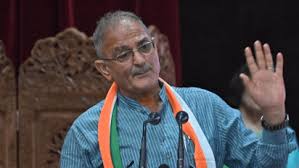New Ladakh L-G Kavinder Gupta: ‘Statehood, Sixth Schedule demands are natural… We only need to talk with people’

Kavinder Gupta, the newly appointed Lieutenant Governor of Ladakh, has acknowledged the region’s key concerns. He described demands for statehood and inclusion under the Sixth Schedule as “natural” and promised open discussions with the people. His statement signals a shift in tone from previous administrations, with a stronger emphasis on listening to local voices.
‘Demands Are Natural’: Gupta Calls for Dialogue
Soon after taking charge, Gupta spoke to the media and community representatives. He said, “People of Ladakh have every right to raise questions about their future. Demands for statehood and the Sixth Schedule are natural in a democracy.”
He stressed that his role is not to reject these demands but to understand them. “Solutions come through honest conversations. We must listen with sincerity,” he added.
Why Ladakh Seeks Sixth Schedule and Statehood
Ladakh became a Union Territory in 2019 after the reorganization of Jammu and Kashmir. Since then, the region has had no legislative assembly or elected body. This lack of political representation has fueled frustration among locals.
Many groups now demand safeguards under the Sixth Schedule. This part of the Constitution gives tribal communities more control over their land, laws, and governance. Currently, it applies only to parts of northeast India. Applying it to Ladakh would be new but not legally impossible. Ladakh’s tribal-majority population gives it a strong case.
Locals and Leaders Respond to Gupta’s Statement
Political and community leaders cautiously welcomed the L-G’s remarks. Former MP Thupstan Chhewang said, “It’s a good start to hear these demands being acknowledged. But people want action, not just kind words.”
He urged the new L-G to hold structured talks with all stakeholders. “Token meetings won’t solve real issues. Every group must be involved,” Chhewang added.
In the streets of Leh and Kargil, the reaction was hopeful but reserved. “We’ve heard promises before. Let’s see if this time it’s real,” said Dorje Namgyal, a teacher from Leh.
Does This Signal a Policy Shift from Delhi?
Gupta’s approach appears more people-friendly than his predecessors. His experience as Deputy Chief Minister of Jammu and Kashmir gives him insight into regional issues. Observers say the Centre may now want a softer approach in Ladakh.
Protests over land rights, environmental rules, and job reservations have increased. Public anger has grown, especially among the youth. In this climate, Gupta’s appointment could help ease tensions if followed by real changes.
Gupta Promises Development with Local Participation
Apart from political reforms, Gupta emphasized development goals. “We want to build infrastructure and improve education. But this must happen with respect for local culture and ecology,” he said.
He also plans to meet youth groups, women’s organizations, and religious leaders. “People need to feel involved in shaping their future. Listening is the first step,” Gupta added.
The Road Ahead: Can Dialogue Deliver Results?
Ladakh’s path forward remains complex. Granting statehood would need a constitutional change. Including Ladakh under the Sixth Schedule may be quicker but still requires political will. Any solution must balance regional autonomy with national interests.
Gupta’s promise to engage in dialogue brings hope. However, success will depend on how those talks are held and what outcomes follow. Without concrete steps, trust will be hard to build.
Conclusion
Kavinder Gupta’s first remarks as Ladakh’s Lieutenant Governor mark a promising beginning. By calling local demands “natural” and stressing the need for open talks, he shows a willingness to connect with people. Now, Ladakhis await action to back those words.






